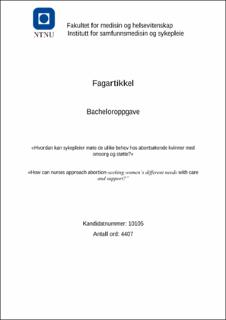| dc.contributor.advisor | Andre Beate | |
| dc.contributor.author | Wroldsen Bettina Nygaard | |
| dc.date.accessioned | 2020-07-17T16:00:33Z | |
| dc.date.available | 2020-07-17T16:00:33Z | |
| dc.date.issued | 2020 | |
| dc.identifier.uri | https://hdl.handle.net/11250/2669432 | |
| dc.description.abstract | Innledning: Artikkelen tar for seg sykepleiers opplevelse og erfaring i møte med kvinner som søker provosert abort i første trimester (uke 0-11). Hensikten med studien var å undersøke hvordan sykepleiere møter kvinnenes ulike behov i abortprosessen, og hvordan de viser støtte og omsorg til kvinnene.
Metode: I studien er det brukt en kvalitativ tilnærming med semi-strukturerte intervjuer. Til sammen ble det gjennomført fire individuelle telefonintervju med sykepleiere fra både gynekologisk poliklinikk og gynekologisk sengepost. Det ble også gjennomført systematiske observasjoner av tre abortsamtaler. Intervjuene og observasjonene ble analysert og systematisert ved hjelp av meningsfortetning.
Resultat: Resultatene viser at sykepleierne opplever at abortsøkende kvinner har svært ulike følelser og behov i abortprosessen, og at enkelte opplever skyldfølelse når de kommer for å ta abort. For å møte kvinnenes ulike behov kartlegger informantene kvinnen i stor grad ut ifra deres kroppsspråk. De opplyser at å lese pasientens kroppsspråk, lytte, og støtte deres valg er viktige aspekter i møte med kvinnene. Sykepleiere ønsker ikke å fremstå som fordømmende eller påvirke kvinnenes valg. De er derfor bevisst på sitt ordvalg.
Konklusjon: Studien har vist at det følelsesmessige utgangspunktet til abortsøkende kvinner varierer i stor grad. Noen kvinner er trygge i sitt valg, mens andre har sterke ambivalente følelser. Studien har vist at sykepleierne ved gynekologisk avdeling ønsker å skape de beste forutsetninger for å ivareta og skape trygghet hos de abortsøkende kvinnene. Informantene tilpasser omsorg og støtte til hver enkelt kvinne og deres individuelle behov. | |
| dc.description.abstract | Introduction: The objective of this article is to identify nurses experience with women who seek induced abortion in the first trimester (0-11 weeks). The purpose of the study was to investigate how nurses approach the women's different needs in the abortion process, and how they show their support and care.
Method: The study uses a qualitative approach with semi-structured interviews. In total, four individual telephone interviews were conducted with nurses from both the gynecological polyclinic and the main gynecological ward. Systematic observations of three abortion meetings were also conducted. The interviews and the observations were analyzed and systematized by condensed meaning-method.
Results: The results show that the informants experience that women have different feelings and needs in the abortion process. Some women experience guilt when they come to have an abortion. To approach the different needs of women, the informants read the women's body language. They state that reading the patient's body language, listening, and supporting the women's choices were important aspects of approaching the abortion-seeking women. Results show that nurses do not want to appear judgmental or influential upon the women's choices and are conscious of their choice of words when they approach the women.
Conclusion: The study concludes that women experience the abortion process in very different ways. Some women are confident in their choices, while others have strong ambivalent feelings. The study has shown that the nurses at the gynecological ward want to create the best conditions for a safe environment for the abortion-seeking women. They adapt care and support to each woman and their needs. | |
| dc.publisher | NTNU | |
| dc.title | "Hvordan kan sykepleier møte de ulike behov hos abortsøkende kvinner med omsorg og støtte?" | |
| dc.type | Bachelor thesis | |
